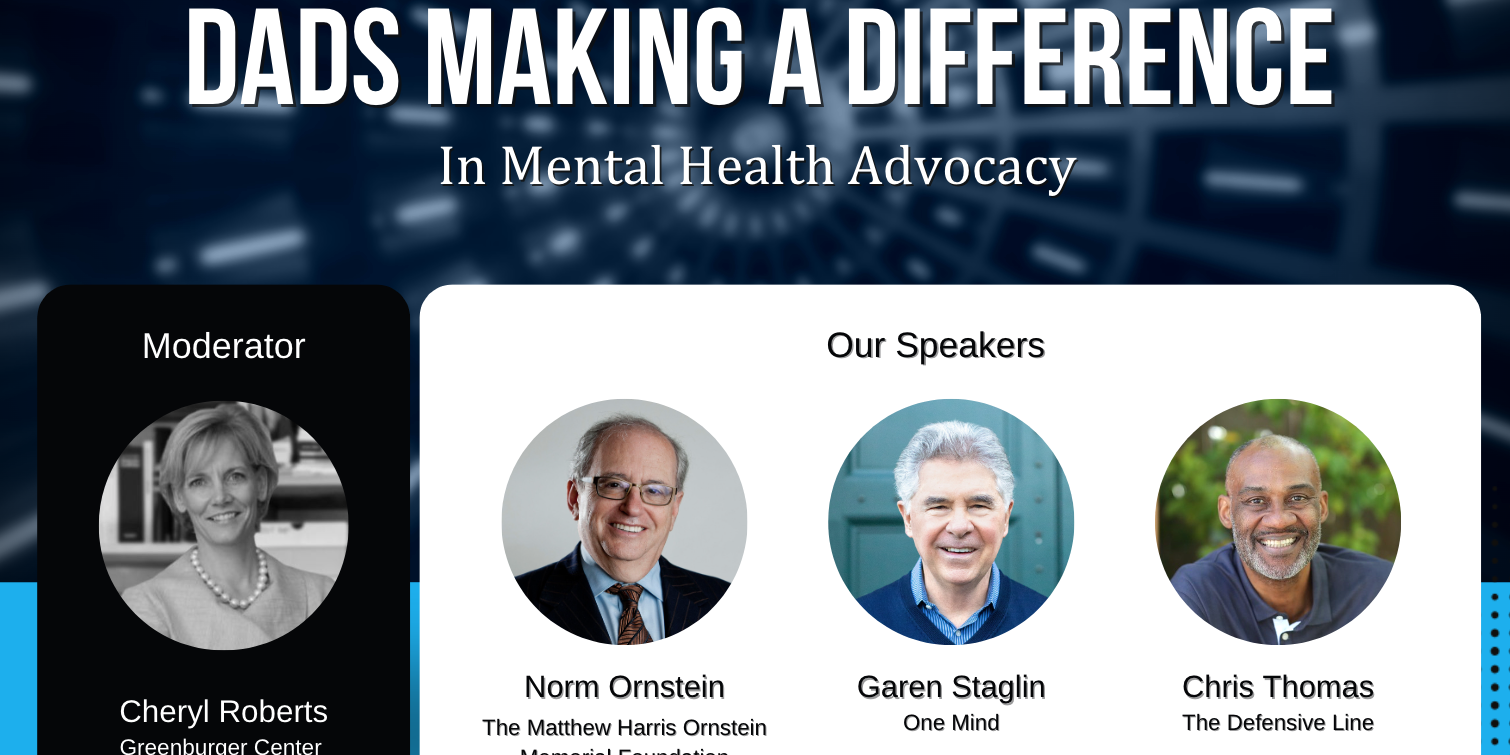Vrinda Madan
Flawless Fellow
Medical Student, Johns Hopkins University School of Medicine
As we come to the end of June, the month we associate with Father’s Day, the Flawless team had the opportunity to tune into the Greenburger Center’s “Dads Making a Difference in Mental Health Advocacy” panel discussion. We heard from three incredibly inspiring fathers who shared how they turned grief into purpose.
The first panelist was Chris Thomas. He described his daughter Ella as bold, funny, loving, and a healing force for those around her. Tragically, Ella took her own life at the age of 24. She suffered from depression and trauma that she felt were too burdensome to share with others. In fact, on the same day that she died, she was helping two of her other friends who were struggling with depression – preventing them from taking their own lives. It is this caring nature that her family is carrying forward as Ella’s legacy. The Thomas family formed a nonprofit called The Defensive Line. Their organization aims to prevent youth suicide, with an emphasis on People of Color. The Defensive Line has various programming, including suicide prevention workshops, storytelling, and advocacy efforts. Driven by a mission to change how we communicate and connect over mental health, they are working to dismantle the stigma and barriers to care that people of color often experience.

We next heard from Norm Ornstein. Norm’s son, Matthew – a national debate champion, Princeton graduate, standup comedian, and Hollywood writer died in an accident after living with serious mental illness. Norm recounted the story of his son, who found great joy in the simple things like camping out under the stars during his time abroad in South Africa. At the age of 24, Matthew experienced a psychotic break and struggled immensely for the next 10 years. While his condition was never formally diagnosed, Matthew was affected by anosognosia, which is the inability to recognize an illness. As medical students, we are trained to identify whether or not individuals have insight into their disorder, as the lack of such an awareness can make treatment plans more complex. Due to anosognosia, Matthew did not accept the treatment needed for stability and accidentally died from carbon monoxide poisoning. Norm shared a resource that he has found helpful in the understanding and treatment of individuals that have anosognosia, Dr. Xavier Amador’s book: “I Am Not Sick, I Don’t Need Help!: How to Help Someone with Mental Illness Accept Treatment,” which you can learn more about here.

Like Chris Thomas, Norm and his family also strive to channel this grief into purpose through the Matthew Harris Ornstein Memorial Foundation. In honor of their son, they created a debate camp for youth from underserved communities in the Washington, D.C. area. They currently have over 200 student attendees who are learning the craft of debate and are now earning admissions to the top colleges of America. Additionally, the Ornstein family has committed themselves to learn more about mental health—they are particularly interested in the work done at the Greenburger Center at the intersection between criminal justice and mental health reform.
Our final panelist was Garen Staglin. His son, Brandon, was diagnosed with schizophrenia during his time in college at Dartmouth. Influenced by this diagnosis, the family was motivated to not only learn more about brain health but also to pioneer the advancement of our understanding through research. In 1995, Garen and his wife, Shari, launched One Mind – now one of the leading brain health nonprofit organizations. One Mind takes a very innovative three-pronged approach that includes cutting-edge scientific research, initiatives for early prevention, and breaking down social stigma through the integration of mental health awareness in society. Their son, Brandon, is now at the forefront of these efforts as he serves as president of One Mind.

To wrap up the seminar, the three panelists were asked for their messages of hope—especially as each of them was able to channel incredibly challenging situations into catalysts for mental health advocacy. One of the key messages from both Garen and Norm was that this is the time to enact change; never before has there been this much focus on mental health, willingness to open up, and the scientific prowess to advance our understanding of brain health. Furthermore, as Norm noted, there is bipartisan support for this topic—making it all the more exciting to seize this timing and opportunity. To add to these messages of hope, Chris described how mental health advocacy is ultimately about connectivity, relationships, and just helping each other out. Garen emphasized the need for unconditional love when our loved ones are struggling with their mental health. So long as we continue to do that, there is hope everywhere we look.
Overall, this was an incredibly moving virtual panel and the perfect way to wrap up our Father’s Day month of June. We would like to thank the Greenburger Center and Cheryl Roberts for doing such a lovely job in organizing and moderating this conversation. And of course, we are so grateful for these three inspiring flawless fathers for sharing their perspectives with us and for everything they continue to do in the realm of mental health advocacy.
To hear the messages of hope shared by our panelists watch this inspiring video!







